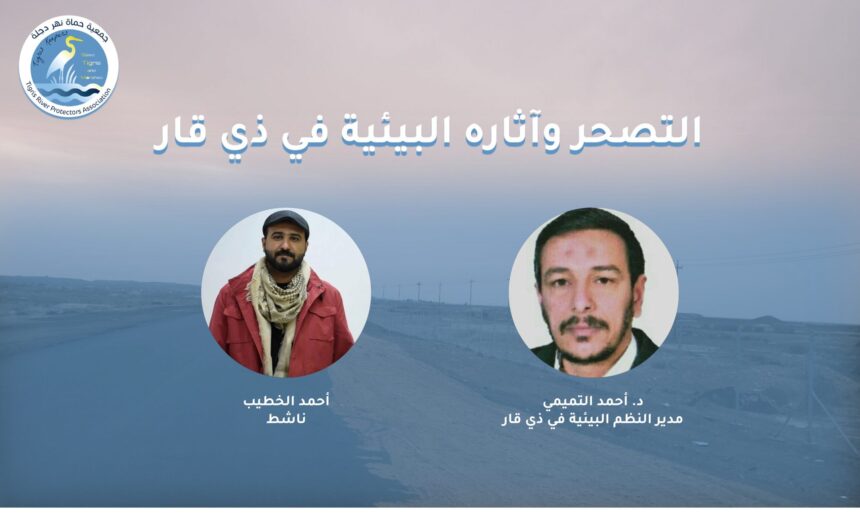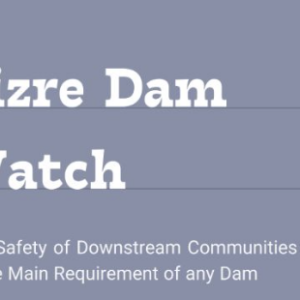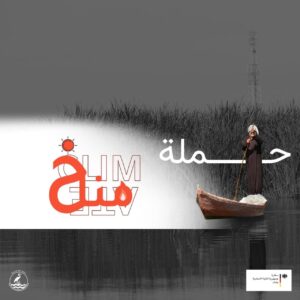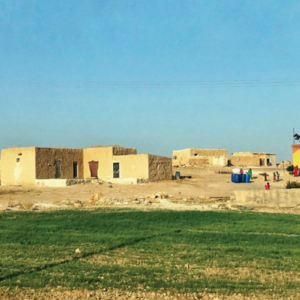Iraq, in general, suffers from desertification, which is one of the environmental disasters, as soil’s health declines rapidly resulting destructive situations transforming agricultural areas into deserts, which is what occurs on a large scale in Thi Qar governorate.
Therefore, Humat Dijlah continues environmental webinars aiming to raise the environmental awareness and urging the environment-related authorities to address environmental problems, on Wednesday, December 29, 2021, Humat Dijlah organized its third online session “Desertification and its Environmental Impacts in Thi-Qar,” to shedding light on the causes of this phenomenon and discuss the possibility of addressing it, the session was hosted by the Plant Expert and Director of the Natural Environment Systems Department, Dr. Ahmed Razzaq Al-Tamimi, and the Geologist and Civil activist, Ahmed Al-Khatib, as a number of environmental activists, government officials and those interested individuals attended and participated in the session on both Zoom and Facebook Live.
The session began by defining the desertification phenomenon and the most important causes that lead to its formation. Al-Tamimi explained that Global Warming and the effects of Climate Change are among the biggest and most dangerous natural factors causing this phenomenon, such as high temperatures that increase the evaporation rates of groundwater and lead to dryness and desertification of lands, in addition to the encroachment of sand dunes by wind, Al-Tamimi added that human causes also play a role in this phenomenon, as these causes are represented by the misuse of land resources, unscientific agriculture, excessive cutting of trees and increasing population expansion instead of agricultural yards, in addition to the depletion and misuse of water resources. Al-Tamimi pointed out that all these things, in turn, lead to soil desertification and low productivity of soil.
While al-Khatib attributed the cause of desertification to the geographical location of Thi-Qar Governorate and southern Iraq, saying, ” From the geological point of view, this region is considered one of the aging regions receiving river water and wind, as the dust that is transported by rivers and winds over long distances, reaches this region in the form of sandy particles or granular soil devoid of minerals and organic materials that make the soil productive or investable,”
“People contribute to the expansion of desertified lands, but the natural factor is the main cause!” Al-Khatib added.
Speaking about the most important effects and results caused by desertification, Al-Tamimi said that the effects of desertification are mainly represented by climatic and environmental influences, such as increasing the soil salinity, increasing sand dunes, decreasing biodiversity, and increasing temperatures and dust storms, “According to our statistics, Thi-Qar Governorate is one of the cities that suffer from dust storms throughout the summer months, due to the impact of the sand dunes area northwest of the governorate, as the crust of the soil in that region is loose and easily blown by winds, leading to storms blowing towards Thi-Qar.” Al-Tamimi said, and pointed out that desertification could lead to a lack or threat to the country’s food security, and thus would have a significant impact on the economic and social scale.
About the government’s role in combating this problem, Al-Tamimi explained that the political instability in developing plans to invest land resources and plans for better water management, in addition to the water policy of neighboring countries and the decline in water imports, has exacerbated the water crisis in many areas, including Thi-Qar Governorate, who suffered so long from thirst and drought. Al-Tamimi praised the need for government agencies to pay attention to this file, saying, “The Ministry of Environment must work in partnership with the Ministry of Water Resources and the Ministry of Agriculture, for the purpose of establishing a suitable water management for Iraq, to stop the waste of water resources and to use the modern irrigation methods, and to improve drainage networks, as well as to work on the sand dunes project, support the agricultural sector in addition to supporting green belts.”
In a related context, Al-Khatib indicated that the water deficit that the country suffers from leads to use the instant agriculture, which is another cause of desertification, explaining that some arable lands are invested only in the rainy season and are left for the rest of the seasons due to the lack of water, leading arable lands to be barren, Al-Khatib emphasize the need to find solutions to deliver water to these areas by the related authorities, so that this soil would be evergreen.
As for the damage caused by investment companies, Al-Khatib indicated that despite the supervisory role of the Thi-Qar Environment Directorate and the Environmental Impairment Law, which obliges violators who contribute to land desertification or air pollution to pay fines, However, investors outside the city wall are still building oil facilities and investment companies without the approval of the related authorities and without supervising, “the expansion of these facilities and their leftovers of petroleum residues, carcinogens and toxic smoke emissions that spread, lead to the migration of people and the extermination of pedestrian creatures or those inside the soil, which revives the soil and helps to plow it and ensure the organic materials inside the soil and increase its productivity, so these companies are killing these lands by turning them into barren lands.” Al-Khatib said.
“Human expansion is also an important reason in increasing desertification, so this expansion must be in a way that protects the land and does not cause any damage or lead to destruction, as the soil needs many years to recover if we aim towards reviving it again!” Al-Khatib added.
About the importance of surrounding cities with green belts, Al-Tamimi said that Thi-Qar is one of the governorates most in need of a green belt project, “Although the green belt is not enough to combat desertification, it basically protects cities from dust and storms, as trees work to break the intensity of the dust-carrying winds, therefore, the green belt protect cities from the effects of desertification and stops the depletion of lands resulting by the encroachment of sand dunes. As for combating desertification, other larger projects are needed, such as the sand dune stabilization project, which is carried out by digging trenches and burying them with sand, then covering them with clay soil and re-cultivating them and turning them into farms,” Al-Tamimi said, adding, “This project was under implementation, but the lack of financial allocations led to its halt!”
In this regard, Al-Khatib added, “Although the green belt does not cover large areas, it will contribute in lowering the temperature and thus prevent the evaporation of high-level groundwater, as the high level of groundwater and its proximity to the surface leads to water evaporation due to high temperature, and this will leave the groundwater salts inside the soil, which reduce the soil efficiency and increase its desertification.
On the other hand, Al-Khatib spoke about the role of civil society organizations and activists interested in environmental issues, praising the efforts made by organizations, voluntary teams and individual activists who harnessed their efforts to protect the environment, as he said, “Civil society is a partner of the local government in all problems and issues, the environmental issues specifically, as we can clearly see their tremendous efforts and effects through appeals, advocacy campaigns and work to raise environmental awareness among community, as they are closer to the community than government agencies, so their work is very necessary and important.”, Al-Khatib praised the necessity of increasing government agencies’ interest in these organizations, cooperating with them, and using their ideas and solutions, as they are quick and effective solutions due to the activists’ experience and their knowledge of the environmental reality of other societies.
At the end of the session, Al-Khatib praised the importance of researching how to revive the soil again and come up with a solution to this disaster, and the need to draw on the expertise and experiences of other countries that suffered from the same problem. There should also be awareness campaigns by the government to make it clear to the community that the government is concerned with environmental issues. The related authorities must work to advance the environmental reality and address environmental disasters, or at least stop the exacerbation of the causes of these disasters.
Al-Tamimi mentioned that despite the fact that the Ministry of Environment cannot do much, the measures and future plans are promising, which are set towards facing the threat of desertification.
This webinar is part of a series of online sessions organized by Humat Dijlah Association to shed light on the environment and water issues of the cities of the Tigris and Euphrates rivers through online platforms.
To Watch The Entire Webinar on YouTube HERE.





Leave a Reply